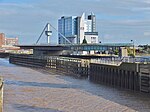The Port of Hull is a port at the confluence of the River Hull and the Humber Estuary in Kingston upon Hull, in the East Riding of Yorkshire, England.
Seaborne trade at the port can be traced to at least the 13th century, originally conducted mainly at the outfall of the River Hull, known as The Haven, or later as the Old Harbour. In 1773, the Hull Dock Company was formed and Hull's first dock built on land formerly occupied by Hull town walls. In the next half century a ring of docks was built around the Old Town on the site of the former fortifications, known as the Town Docks. The first was The Dock (1778), (or The Old Dock, known as Queen's Dock after 1855), followed by Humber Dock (1809) and Junction Dock (1829). An extension, Railway Dock (1846), was opened to serve the newly built Hull and Selby Railway.
The first dock east of the river, Victoria Dock, opened in 1850. Docks along the banks of the Humber to the west were begun in 1862 with the construction of the West Dock, later Albert Dock. The William Wright extension opened in 1880, and a dock further west, St Andrew's Dock, opened in 1883. In 1885, Alexandra Dock, a new eastern dock was built connected to a new railway line constructed by the same company, the Hull Barnsley & West Riding Junction Railway and Dock Company. In 1914, King George Dock was built jointly by the competing railway companies, the Hull and Barnsley company and the North Eastern Railway; this was extended in 1969 by the Queen Elizabeth Dock extension. As of 2016 Alexandra is being modernised for use in wind farm construction, with a factory and estuary side quay under construction, a development known as Green Port Hull.
The Town Docks, Victoria Dock, and St Andrew's Dock fell out of use by the 1970s and were closed. Some were later infilled and redeveloped, with the Humber and Railway docks converted for leisure craft as Hull Marina.
Other facilities at the port included the Riverside Quay, built on the Humber banks at Albert Dock for passenger ferries and European trains, and the Corporation Pier, from which a Humber Ferry sailed to New Holland, Lincolnshire. Numerous industrial works were served by the River Hull, which also hosted several dry docks. To the east of Hull, Salt End near Hedon became a petroleum distribution point in the 20th century, with piers into the estuary for shipment, and later developed as a chemical works.
As of 2023, the main port is operated by Associated British Ports and is estimated to handle one million passengers per year; it is the main softwood timber importation port for the UK.











